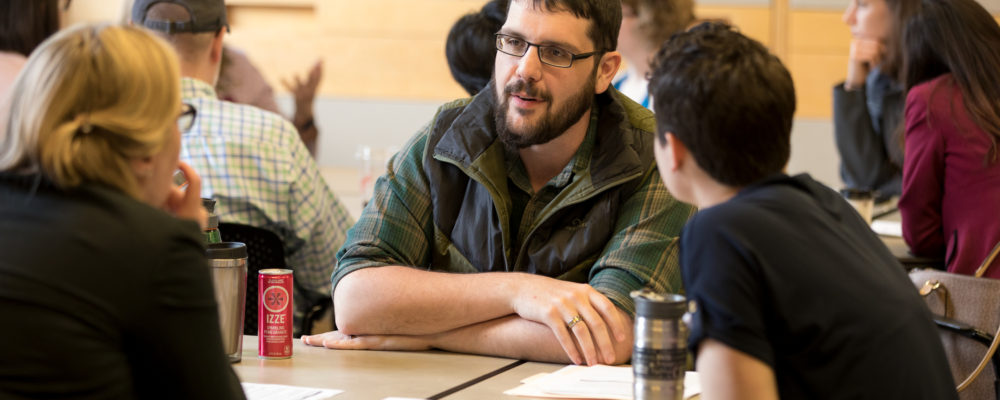Building Mentorship Skills for Academic Careers

In this series of interactive workshops designed for current Cornell graduate students and postdocs and open to those in all fields, you will develop essential research mentoring skills, particularly in disciplines where research is conducted collaboratively and in teams. Effective mentoring of student research is a key skill influencing everything from research productivity to motivation. Learn best practices for mentoring undergraduate, graduate, and postdoctoral researchers, and develop planning and communication skills needed to guide individual mentees and research teams.
- Days and Times: Tuesdays from 2-4 pm ET on February 20, March 5, 19, and 26, and April 16, 2024
- Format / Location: Primarily offered as in-person interactive workshops and breakout discussions involving case studies, with supporting materials available in a Canvas site. Hybrid capability may be available for participants who are not in Ithaca, with advance notice.
- Contact: Dr. Colleen McLinn, [email protected] or 607-255-2030
- Registration for Spring 2024 is now closed. Check back in Fall 2024 for Spring 2025 information
Interested participants should apply prior to the start of the series with the expectation of attending all workshops and actively participating in small and large group discussions. Please advise the organizers of any dates you would need to miss or arrive late, and accessibility needs at registration or prior to the first session. Building Mentorship Skills program completion certificates will be provided for fully participating in at least 4 of 5 sessions).
Related Upcoming Workshop
The Mentoring Lab: Build Skills for Effective Undergraduate Research Mentorship
Registration required by May 10, 2024
- Session 1: May 14, 2024 from 10:00 AM – 12:00 PM, G10 Biotechnology Building
- Session 2: May 30, 2024 10:00 AM – 12:00 PM, G10 Biotechnology Building
If you have questions, please contact, Dr. Laura Schoenle ([email protected]).
Presenters: Dr. Colleen McLinn and Dr. Evelyn Ambríz, Cornell Graduate School
Join us for a two-part interactive discussion and workshop about best practices for mentoring undergraduate researchers. You will learn evidence-based mentoring techniques, articulate your own mentoring style, and engage with tools that you can use right now to enhance your mentoring practice. This workshop is ideal for the mentors of undergraduate researchers who would like to refine their mentoring practices or who are first-time mentors to undergraduate researchers.
In part one, we’ll use case studies and discussion prompts from the Center for Improvement of Mentored Experiences in Research to explore foundational questions such as: “How can you set expectations for mentor and mentee to make sure the project and relationship stay on track? What are common challenges students face when getting started with research?”
In part two, we will engage with questions like “How can we ensure mentees feel welcome and support their growth and confidence as researchers?”
Additionally, we will preview new tools and resources being developed at Cornell as part of Faculty Advancing Inclusive Mentoring (FAIM) Resource Center, primarily designed for use in graduate education and the professoriate, but highly relevant to mentors at all levels.
Space is limited and registration is required. All registrants are expected to attend both sessions. Workshops are facilitated by Dr. Colleen McLinn (cmm252) and Dr. Evelyn Ambríz (ea229) from the Cornell Graduate School. If you have questions, please contact, Dr. Laura Schoenle ([email protected]).
Spring 2024 Series
Sessions meet between 2:00 – 4:00 pm ET on Tuesdays, primarily in-person with hybrid capabilities.
February 20 – What Makes a Good Mentor and Mentee? Exploring Learning, Motivation, and Values
- Understand key principles of learning and theories of motivation that can help you build a strong research group, and even learn more about yourself and values you wish to communicate to mentees.
March 5 – Aligning Expectations and Guiding Doable Projects
- How do you design a doable project with a defined timespan for a relative novice in your discipline? Learn how to set expectations for mentor and mentee to make sure the project and relationship stay on track.
March 19 – Creating Inclusive Research Settings
- Create and sustain a research group and academic climate in which each individual feels safe and supported. We will discuss how to create a welcoming environment for groups typically underrepresented in higher education, while reflecting on our own identities and experiences and how they may be strengths or blind spots in our mentoring.
March 26 – Handling Tricky Mentoring Situations
- Learn how to address some of the trickiest situations you might encounter when mentoring undergraduate researchers or graduate students, from modeling appropriate research ethics to sharing co-advised students. We will also discuss how you might solicit feedback and turn around projects that aren’t going as planned (from the mentor’s perspective).
April 16 – Supporting Mentees’ Professional Development
Helping Students Present and Publish, and Writing Fair Letters of Recommendation
- Revisit some key ideas about effective communication to introduce your students to writing about and presenting their work. Learn how to write a fair letter of recommendation, and what not to say. Reflect on our emerging mentoring philosophies and goal statements.
More Information
Building Mentorship Skills for Academic Careers is sponsored by the Graduate School’s Future Faculty and Academic Careers program, part of the Office of Career and Professional Development, and based on a highly regarded national curriculum. A similar course is offered in online, synchronous format through the CIRTL Network annually. A compressed three-session version has been offered in the past for existing Cornell groups or units (e.g., Geneva AgriTech) who can confirm interest from 15 or more participants. Please inquire with [email protected] for more information.


